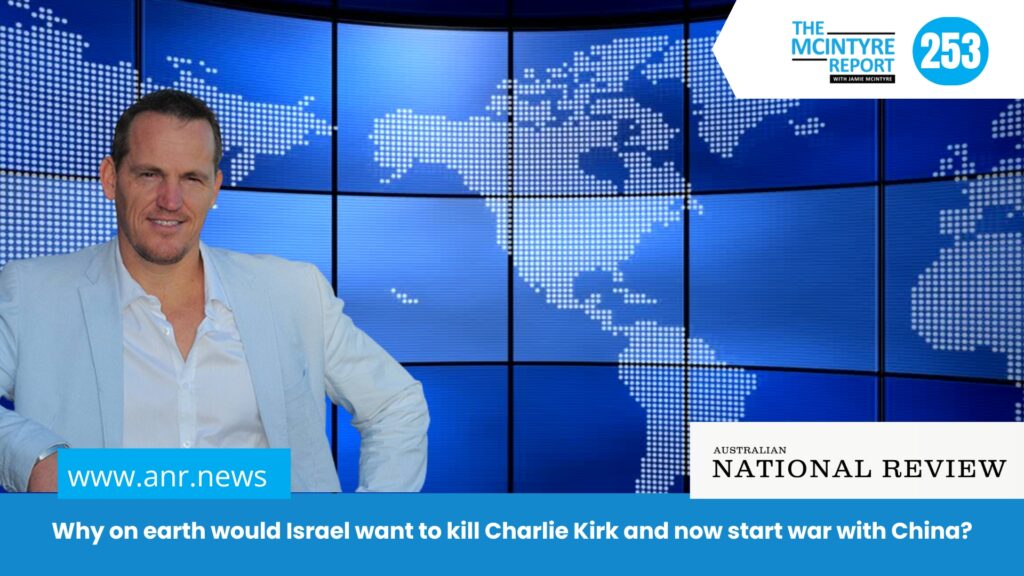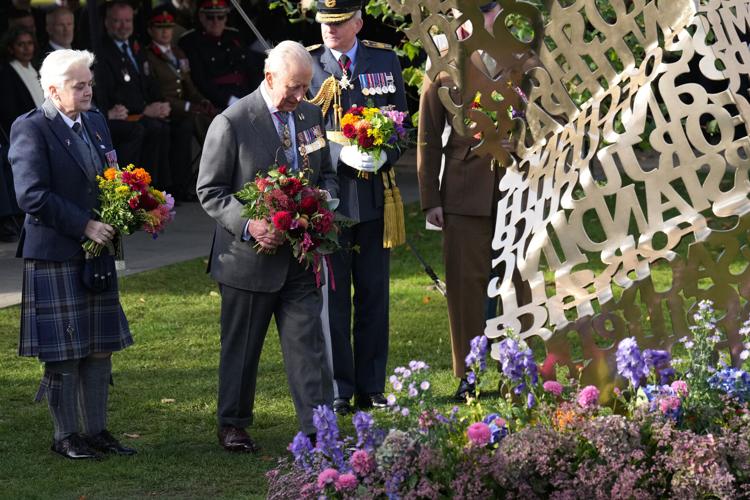King Charles Lays Flowers at the UK’s First National LGBT Armed Forces Memorial to those Hit by the Military’s Former ‘Gay Ban’
By ED HOLT and ADAM POGRUND, TRAINEE REPORTER
The King laid flowers at the official dedication of the UK’s first national memorial commemorating LGBT military personal who were affected by the army’s former ‘gay ban’.
The Government-funded memorial was unveiled on Monday at the National Memorial Arboretum in Staffordshire and the event marked the monarch’s first official engagement in support of the LGBT community.
LGBT military charity, Fighting With Pride, said the sculpture represents a ‘powerful step forward in recognising and honouring the service and sacrifices’ of the LGBT armed forces community after their historic mistreatment, while gay veterans praised Charles’ attendance.
The public tribute takes the form of a crumpled bronze letter made up of words taken from evidence from personnel who were impacted by the ban, which was in place from 1967 until January 11, 2000.
Under the policy, members of the armed forces who were – or were thought to be – gay or transgender were subjected to brutal interrogation and dismissal.
Thousands of people were investigated, discharged or forced to leave their careers because of their actual or perceived sexual orientation or gender identity.
They also faced lifelong consequences, including being vilified by family and friends, and losing access to their military pensions.
King Charles III, who is also the head of the armed forces, dedicated the memorial to all LGBT people who have served and continue to serve in the military.

The King laid flowers at the official dedication of the UK’s first national memorial commemorating LGBT military personal on Monday

The event marked the monarch’s first official engagement in support of the LGBT community
Carol Morgan, from Surrey, was one of dozens of former soldiers, sailors and airmen and women who attended the ceremony.
She joined the Army in the late 1970s but was thrown out after four years of service after being sent to a psychiatrist because her sexuality was seen as a mental illness and seeing her room ransacked.
Ms Morgan said: ‘I hid my sexuality for over 36 years. It destroyed me completely.
‘This memorial means everything to us.
‘Generations are going to know that we did exist and we weren’t just a dirty little secret.’
Alison Smitham, from Cumbria, was dismissed within 18 months of joining the Army in 1983.
She said: ‘Since I was 11 years old I wanted to join the armed forces and, in a flash, it was just gone.
‘It was just such a devastating thing.
‘It’s hard for someone to understand who’s not been in this circumstance exactly what it felt like.
‘It’s just almost life ending.’

The public tribute takes the form of a crumpled bronze letter made up of words taken from evidence from personnel who were impacted by the ban
Former RAF firefighter Carl Austin-Behan joined in 1991 aged 19 but was dismissed six years later for being gay.
He said: ‘In April 1997 the air force found out I was gay and within 10 minutes I was escorted off camp.’
He said he was told he was ‘incompatible to service life’, he ‘lost everything’ and was made homeless.
The King heard speeches from serving personnel and an address from Ed Hall, chairman of Fighting With Pride, which oversaw the construction and design, and spearheaded efforts to get justice for veterans.
After the ceremony in Alrewas, the King met LGBT veterans including those impacted by the discrimination, and also serving personnel.
Claire Ashton, who served in the Royal Artillery, said her ‘dream career’ was ruined when she was forced out of the Army in 1972, aged 21.
She said: ‘This is a moment I never believed would happen, a moment full of meaning and, finally, of pride.
‘I’m in my 70s now and have forever lived with the psychological scars of being kicked out – ‘medically discharged’, as it was labelled on my records.’
Ms Ashton added: ‘I was punished for being myself.
‘It means so much to be with others who’ve been through similar nightmares to me and, like me, are making peace with the past.’
Sharon Pickering, who served in the Royal Navy before being dismissed in 1991, said: ‘For me, it feels like being welcomed back into a family I missed so much.

LGBT veterans praised Charles’ attendance. He dedicated the memorial to all LGBT people who have served and continue to serve in the military
‘It’s a place where I can stand tall again, knowing that my service is finally seen and valued.’
In 2023, then-prime minister Rishi Sunak apologised on behalf of the British state for the ‘horrific’ historical treatment of LGBT people who served in the military, after an independent review set out 49 recommendations including financial reparations and a public memorial.
The review heard shocking accounts of homophobia, bullying, blackmail, sexual assaults, ‘disgraceful’ medical examinations and conversion therapy.
In December 2023, it was announced that veterans who suffered mistreatment under the ban will receive up to £70,000 each as part of the redress scheme.
Veterans who were dismissed or discharged because of their sexual orientation or gender identity are to receive £50,000.
Personnel who were ‘negatively affected’ by the ban during their time in the service between 1967 and 2000 will be given up to another £20,000, the ministry said.
The payments will be exempt from income tax and means-tested benefits.
Veterans who lost their rank as a result can apply to have their rank restored and discharge reason amended, ministers said.

Former RAF firefighter Carl Austin-Behan (pictured) said he was escorted off camp within 10 minutes of the air force finding out he was gay

A group of veterans impacted by the historic gay ban in Whitehall last year. The army’s ‘gay ban’ was in place from 1967 until January 11, 2000
The memorial has been funded by a £350,000 grant from the Office for Veterans’ Affairs at the Ministry of Defence, having been designed by the Abraxas Academy collective of artists.
Peter Gibson, chief executive officer of Fighting With Pride, said: ‘It’s a deeply emotional moment, expressing in physical form that what happened to them should never have taken place – and equally, but crucially – must never be allowed to happen again.
‘The devastation and destruction caused by people expressing their love cut short successful careers and, in some cases, ended lives. ‘
Mr Gibson said: ‘Today is a klaxon call that signals shame can be cast aside and everyone who wants it is welcomed back into their military family.’
Falklands War veteran Roly Woods served for 46 years in the Royal Navy and is the project lead for the memorial for the charity Fighting With Pride.
He said: ‘For me personally, as a veteran who served under the ban, it’s hugely important from a recognition point of view.
‘I was one of the lucky ones who got away with it. Many veterans were dismissed, sent to jail, outed to their families and subjected to interrogations.’
He said: ‘To have the King here as the head of the armed forces is hugely important.’




















